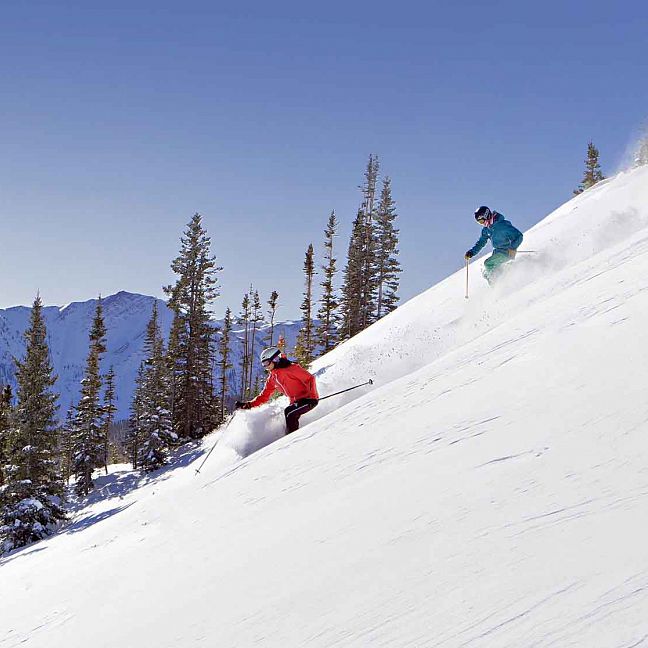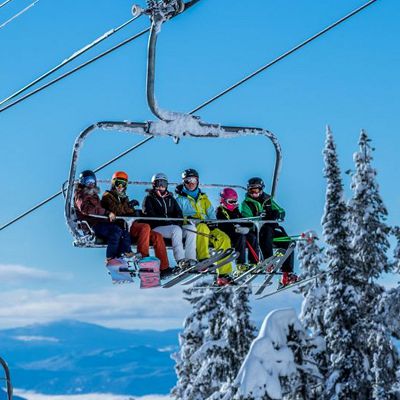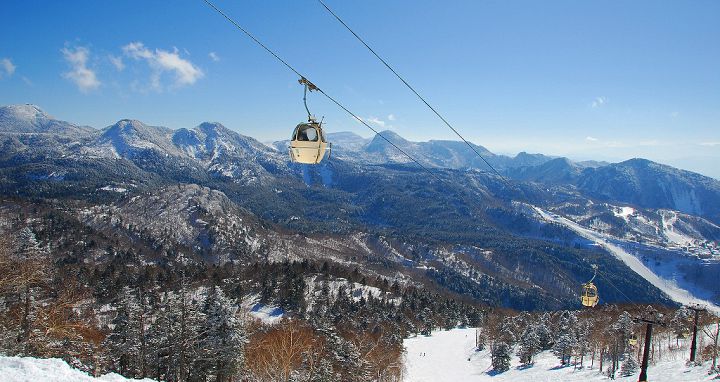Shiga Kogen is an intermediate groomer lover’s paradise. It’s one of the biggest (and highest) ski areas in Japan with 21 mostly interlinked resorts scattered among five valleys. There’s a variety of accommodation in Shiga Kogen, much of which is ski-in ski-out. It’s the perfect place for families or couples who love cruising and who want to explore somewhere different to the masses of Australians. Just be ready to bring out your Japanese phrasebook from time to time!
Scout Loves
- Plenty of groomers that spread out for miles.
- European-style skiing – every day presents the chance to take a ski-journey and explore, rather than hammering a few runs.
- Some resorts are now allowing tree skiing
- The relaxed and peaceful vibe that’s not overrun by Westerners.
- There’s a range of good-value accommodation options, much of which is ski-in ski-out 80/90s-style Japanese hotels.
- The Snow Monster trees at Yokoteyama.
Scout Tips
- Some of the areas provide night skiing.
- It’s a long way from one end of the valley to the other. You may find yourself needing a bus at the end of the day to get back to your hotel. The bus (free with a lift pass) comes about every 45 minutes and is sometimes full.
- Hotels are spread throughout the valley.
- Shiga Kogen has no nightlife and only a handful of restaurants and bars in the Ichinose village area
- Shiga Kogen is the closest ski resort to the snow monkey park.
Scout Review
Shiga Kogen is a beautiful, sprawling ski area set in the heart of Joshinetsu National Park about an hour’s drive from Nagano. Kogen means heights or highlands in Japanese and it lives up to its name – Shiga is one of the highest ski resorts in Japan (the highest point being 2307m/7568 ft). As a result the snow is typically good quality and dry.
It was home to some of the main alpine events during the 1998 Nagano Winter Olympics, including the first Olympic Snowboard Halfpipe (a facility which no longer exists here). As a result the area went through a building boom in that decade and not much seems to have changed since then.
Made up of 21 small (sometimes tiny) resorts spread throughout the area, Shiga Kogen is impressive in its size and presents the opportunity to endlessly cruise and explore. Almost all the resorts are linked by lifts (and in some cases a bit of a shuffle, skate or walk) or you can use a public bus to reach the resorts at the northern end of the valley.
There is terrain for all standards, but beginners and intermediates will have a ball here with a ton of groomers (and, of course, mogul fields too) and several good beginner areas.
Shiga Kogen differs greatly to its close neighbor, Hakuba. It hasn’t seen any investment and development by Westerners and the Japanese (in particular groups of Japanese school children) easily outnumber the tourists on the slopes. Visitors will find that not a ton of English is spoken, even in some of the main hotels but there are enough signs in English to get by, on and off the mountain. A visit to Shiga Kogen will certainly be a more authentic Japanese experience. Note: By authentic we don’t mean historical or traditional Japanese (like Nozawa Onsen) with shrines and older style buildings - it’s just genuinely Japanese.
Due to its spread-out nature there’s no main “heart” to Shiga Kogen. The closest thing to a village is the collection of hotels at Ichinose (pronounced Itchy-nosay) where there are a couple of decent restaurants, a pub and a karaoke bar. Since there is no public transport late at night these are only enjoyed by those within walking distance (or with a generous hotelier willing to shuttle them). Don’t expect any retail or spa therapy and there are only a few non-skiing activities to choose from in the valley. In general, Shiga Kogen is quiet and laid-back, and when not skiing, guests will spend much of their time relaxing in their hotel. Bring a few good books (or an iPad loaded with movies)!
One of the key reasons many peopel choose Shiga Kogen is the proximity to the famous Snow Monkeys. It is very easy to take a few hours off skiing and head down to the monkey park via public bus at the nearby town of Yudanaka, just 25-45 minutes down the road (depending on where you are in the valley). Equally many people visit the monkeys on their way to or from Shiga Kogen. Equally as interesting but less well known, is the opportunity to explore the ancient streets of Shibu Onsen near Yudanaka. It's like stepping back in time, and well worth allowing enough time for a soak at one of the many public onsens. Other interesting day trip options are to the nearby Obuse town - another traditional village with lots of arts and crafts shops, and a sake distillery and a bit further on to Zenkoji Temple in Nagano. As part of your Shiga Kogen ski package, Scout can help organise day guides to explore these sights either as a day trip from Shiga Kogen, or as part of a transfer to a different resort.
Shiga Kogen Skiing
Shiga Kogen is characterized by its spread along several valleys, wide groomers and interconnecting runs. Skiers will spend the first few days studying their piste maps with great curiosity and occasional frustration as they try to figure out what connects, where and how. All 21 resorts are able to be skied on the one ticket. It also includes the free shuttle bus that connects all resorts (usually with a connection in Hasuike). The shuttle bus timetable and map on the reverse side of the piste map are equally as confusing.
Keep in mind that when we say "21 resorts" some of these are just one chairlift and one ski run big. This Map of Shiga Kogen gives a good perspective of the size and layout of the valley and ski area.
Once you get the lay of the land and know how it all works, you’ll enjoy the chance to spend hours cruising around, exploring different areas. There are plenty of slopeside restaurants (mostly in hotels) spread around the valleys, therefore creating a lot of variety and another reason to try aiming for a different area each day. In total there are 179 runs and over 72 lifts, including 16 detachable quad chairs, four gondolas and a ropeway (cable car). Most hotels offer ski rental, or there are a couple of stores in Ichinose, but don’t expect the latest and greatest equipment.
Shiga Kogen is excellent for beginners as most of the areas have green (beginner) slopes. There are several ski schools with English speaking instructors (though you are likely required to take a private lesson to guarantee an English speaker) and magic carpets, particularly at Ichinose, Hasuike and Okushigakogen. You can book lessons via Scout as part of a Shiga Kogen Package.
Intermediates and lower advanced skiers and boarders will have a field day. A group with a wide variety of skiers will be able to ski almost every run together as there is usually an easy way for the less confident to get down.
Advanced skiers will have to settle for cruising since there are only a few steep runs and tree skiing is difficult – not only is the terrain a little mellow for serious deep powder skiing, but skiing in the trees is banned in some areas We’ve heard that the areas of Kumanoyu (where snowboarders are banned) Okushiga Kogen and Shibutoge would be the most liberal as far as this rule goes.
If you are there for more than a couple of days it’s worth taking the bus to get to the villages at the Southern end (Yokoteyama, Kumanoyu and Shibutoge). But go on a sunny day, for a couple of reasons. Firstly it’s fairly exposed and the lifts are slow, so it can be pretty nasty in the wind and snow. Secondly the drive there is quite beautiful, the views terrific and when the conditions are right you’ll be able to ski among the Snow Monster Trees (ice-blasted pine trees that look like something on a different planet) up the top.
Shiga Kogen For Families
Shiga Kogen is a great place for families, particularly those who want to have more of a real taste of Japan. It’s probably not the best choice for families with really young kids, but for an adventurous family that is happy creating its own entertainment at night, it will be perfect.
For families that don’t mind being a bit away from it all (and particularly if you do have younger kids), staying in the Okushigakogen Resort would be really easy – there are two main hotels and they’re right at the base where there’s a good ski school, children’s play area, ski rentals and café (great if parents need to take it in turns to ski/babysit). Although it takes a little longer to access the rest of the ski areas, parents will be able to have a good variety of skiing not far away (particularly when they open up the trees). Hotel Grand Phenix has a swimming pool which may help eat up some time in the evenings, and both hotels in the area have nice lounge areas for hanging out in, or for gathering with other families.
Shiga Kogen Accommodation
Search Hotelsand Deals >
Shiga Kogen obviously went through a building boom in the 90s, in the lead-up to the 1998 Nagano Winter Olympics. In general, the hotels in Shiga Kogen are a little dated (some more so than others) so don’t expect anything too flash. Hotels are spread right throughout the valley and many in great ski-in ski-out locations. The best hotels in the valley are right at the north end, in Okushigakogen. They’re a great way to escape from it all. The biggest cluster of hotels is in Ichinose. If you’re after any sort of après activity find a hotel in this area. Further south, the Hotel Alpenburg in Giant is another Scout favorite due to its more ski lodge-style atmosphere and, more importantly, the father (and original owner) who can be found behind the bar every evening and who happily shares a whisky (or two) with guests.
Search Hotels and DealsResort Activities
Get yourScout Field Guide >
There are only a few on-snow activities other than skiing or boarding in the Shiga Kogen valley. There’s some snowmobiling at the Yakebitaiyama ski area and snow rafting (a Japanese favorite with rafts towed behind snowmobiles). You could likely rent some snowshoes from a rental store in Ichinose. There’s a company based in the Prince Hotel West offering backcountry touring. From the Prince Hotels you can also organise First Tracks tickets to get you on the slopes before anyone else.
However the best side-activity at Shiga Kogen is definitely a trip down the valley to see the snow monkeys at the Jigokudani Monkey Park. It’s relatively easy to get to by taking the Yudanaka bus (timetable on the ski map) and then a 30-40min walk to the Monkey Park from the Kanbayashi Onsen-guchi bus stop. (Regardless of which way you arrive there is always a 30 minute walk along a snowy (sometimes slipery or wet) path to get to the actual monkeys.
It’s also worth taking at least half a day to explore the nearby historic villages of Yudanaka and Shibu Onsen, a beautiful little village with narrow cobble-stone streets, traditional Japanese architecture, temples, restaurants and onsen. Slightly further away but still close, Obuse is also a great town to explore with plenty of shopping, wonderful restaurants and a Sake distillery.
Getting There and Around
It’s pretty easy to get to Shiga Kogen. You can either take a direct Nagano Snow Shuttle (with a changeover at Nagano) or a Chuo taxi from either of the Tokyo airports or you take the bullet train to Nagano and then the local Nagaden bus. There are nine local buses a day (the last departing Nagano at 9pm). Some terminate at Hasuike from where you will have to catch the local shuttle (see below). This can be quite tricky with lots of luggage since you are competing for space with skiers and there is no lower luggage storage compartment (we’ve done this and it isn’t fun, particularly after coming all the way from Australia). If you’re staying in Ichinose or beyond try to catch the bus that goes all the way through – it may even be faster (and certainly easier) to wait in Nagano for a slightly later bus that does go the full distance up the valley. Private transfers and Nagano Snow Shuttle can be organized and booked for you when purchasing a Shiga Kogen Ski Package via Scout.
Getting around Shiga Kogen is best done on skis. This Map of Shiga Kogen Valley gives a good persepctive to get your bearings. The red road leading out of the image below Maruike Ski Resort (center bottom) is the access to the valley from Yudanaka and Nagano beyond. There are no taxis in Shiga Kogen (as far as we could see) and only a few hotels may be generous enough to give you lifts to other areas (we wouldn’t rely on it). Other than skis there is the free shuttle bus, which you’ll need to take if you want to access the three most northern resorts since they aren’t linked by ski runs. There’s a rather confusing map and timetable on the ski-trail map and departures are infrequent, but are pretty reliable to the scheduled times. The last bus is generally around 7.30pm so it’s not intended for night use, and you certainly wouldn’t want to miss the last bus back to your hotel as it would be a very, very long and cold walk. Going the entire way from one end to the other takes about an hour and a half (including a transfer in Hasuike), since they stop very frequently.
The easiest way to get to the nearby resorts of Hakuba, Nozawa Onsen and Myoko Kogen is on the Nagano Snow Shuttle. It takes about two hours and you swap buses in Nagano, but it’s a simple and well-organized process. There are two departures a day and the earliest bus leaves Shiga Kogen at 10.30am, so unfortunately it’s not possible to do day trips (unless you just want a few hours). If you want to use your arrival/departure or inter resort transfer day as an opportunity to see some sights, such as the snow monkeys, Obuse or Zenkoji Temple it is possible to do so by public transport (there are large luggage lockers at Nagano train station) though it does take some coordination and effort to combine various buses and taxis. An easier way is for Scout to organise, as part of your Japan Ski Trip package, a guide that will pick you up at your hotel, take you to whichever attractions you choose and then drop you at Nagano Train Station or your next ski resort hotel. It's very easy and great use of a transfer day, however it can be expensive.
When To Go
Shiga Kogen is generally open from late November with some parts open till early May. The best conditions are usually from the end of January until the end of February.
Try to avoid the periods around New Year’s and Chinese New Year, which can be busy.
Facts & Figures
| Mountain Information | Lifts | Terrain | ||||
| Base Elevation | 4347ft / 1325m | Gondolas | 4 | Beginner | 30% | |
| Summit Elevation | 7562ft / 2305m | Runs | 80 | Intermediates | 40% | |
| Vertical Drop | 3215ft / 980m | Resort Areas | 19 | Advanced | 30% | |
| Skiable Area | 1499ac / 607ha | |||||
| Annual Snowfall | 393in / 10m | |||||
| Longest Run | 3.7 miles / 6.0km | |||||
| Operating Hours | 9.00am – 6.00pm |

Staying in a Japanese Hotel
It’s a wonderful treat to stay in a hotel that offers a glimpse into Japanese culture. Read Scout's guide to what to expect ... read more

The Best Ski Resorts for Intermediates
Check out Scout's Pick for the Best Ski Resorts for Intermediates. read more

Best Resorts for Skiing on a Budget
The best ski resorts for families and skiers on a budget. read more
Dream
Stories, photos and ski resort profiles to help you discover new places and dream about your next ski trip.
Find
Independent and detailed reviews of ski resorts and accommodation to help you find what's right.
Book
Expert advice & competitive rates. From hotel rooms to full ski packages, our agents will find you the best deals.
Ski
Time to go skiing! Get all the inside-tips for your resort in your Scout Field Guide. Free for bookings at major resorts.















Subscribe to the Scout newsletter - a regular roundup of news from the slopes and magazine articles.